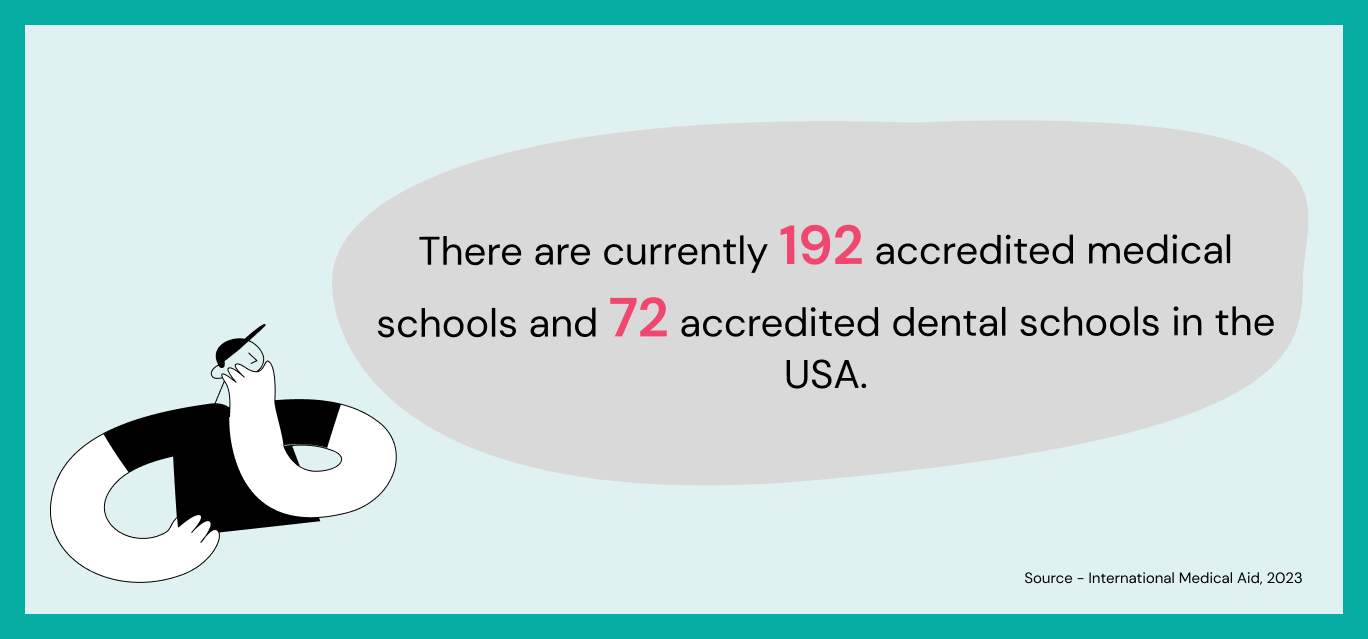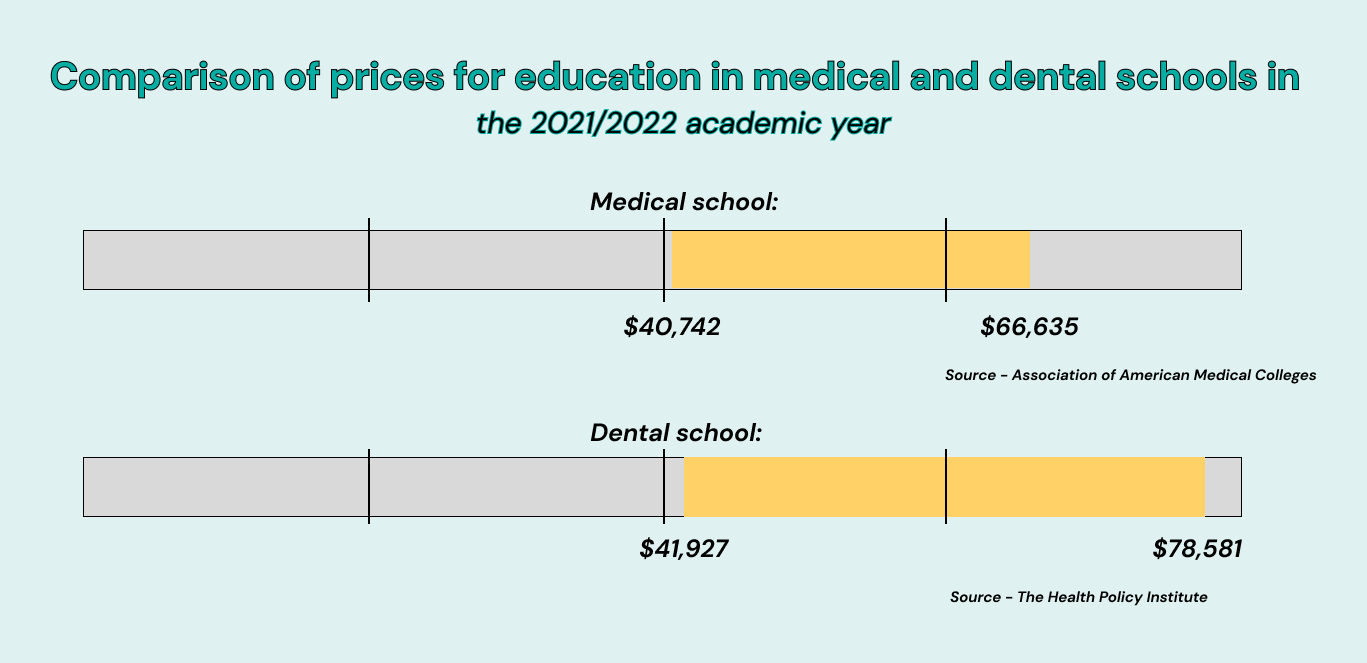Young people who want to devote their lives to caring for the health of others face the age-old dilemma of dental school vs. medical school. It is a tough choice. You need to think about many nuances, such as admission requirements, duration of study, cost, and much more. That is why we have written this post as your faithful companions on the way to a good education. After reading it, you will know everything about dental school curriculum, medical school training, and even dental specialties. Are you ready? Let’s get started!
The Admissions process: Dental school vs. medical school
Both dental and medical schools have their own specifics when it comes to admission processes. Here is a breakdown to help you understand the basic details:
The dental school admissions process:
- Academic background. Dental schools typically ask for a bachelor’s degree with specific coursework in biology, chemistry, and physics. Applicants must also pass the Dental Admission Test (DAT). This will ensure they’ll handle the dental school curriculum in the future.
- Practical experience. Many dental schools prefer applicants with hands-on experience in a dental setting, such as assisting professional dentists or volunteering in dental clinics.
- Personal statement and interview. As part of the application, candidates often submit personal statements and participate in interviews in which they can prove their interest in dentistry and readiness to learn the dental school curriculum.
- Letters of recommendation. It is important for dental schools to see letters of recommendation from professors, dentists, or professionals who are familiar with the applicant’s character and academic abilities.
The medical school admissions process:
- Academic requirements. Most medical schools do not accept applicants without a bachelor’s degree with a strong emphasis on biology, chemistry, physics, and math. In addition, students must provide convincing results from the Medical College Admission Test (MCAT).
- Clinical practice. Much like dental schools, medical schools appreciate applicants who have completed clinical practice, for example, by volunteering in hospitals or observing licensed doctors at work. In their opinion, such candidates are more prepared for medical school training.
- Application letter. Another standard requirement for medical school admission is to write a personal statement in which the candidate must describe their interest in medicine.
- Letters of recommendation. The majority of well-respected medical colleges request letters of recommendation from professors, doctors, or other healthcare professionals to ensure the student is capable of dealing with medical school training.

When choosing between dental school and medical school one of the big factors is the amount of research and writing throughout the programs. Both are academically demanding but especially when it comes to writing big research papers. For dental students this might be topics like advancements in orthodontic technology or new oral treatments. For medical students it’s pharmacological studies, disease pathology or new surgical techniques.
If writing is overwhelming for you, a good research paper writing service can make all the difference. These services provide professional help to students to write well researched and high quality papers that meet the academic standards of both medical and dental schools. By taking the writing load off your hands you can focus more on hands on learning and clinical experience which is key to success in both fields.
Medical vs. Dental School: What’s Different in Their Curricula?
One of the main concerns for young people in the dental school vs. medical school debate is, of course, the curriculum. To help you shed some light on this issue, we have collected the basic facts about the educational programs of both colleges.
The day-to-day life of dental and medical students: Curriculum peculiarities
The dental school curriculum highlights:
- Focus on the dental system, including a range of dental procedures and specialties such as orthodontics and maxillofacial surgery.
- Mostly step-based programs with multidisciplinary basic sciences and faculty-based courses.
- Limited cross-disciplinary schooling during preclinical or clinical training programs.
- Extensive hands-on training in on-campus clinics to learn how to perform procedural requirements and manage assigned patients.
Medical school training basic facts:
- General overview of human body structure, anatomy, pathophysiology, and various medical specialties.
- Cross-cutting courses and rotations in healthcare facilities, community clinics, and physician offices.
- Student teamwork, working closely with residents and physicians, participating in patient care and case presentations.
Dental vs. medical school sdn: Day-to-day differences:
Dental students: Spend a lot of time in clinics learning dental techniques and procedures. They have a phased curriculum for dental specialties.
Medical students: Work in various clinical settings and take part in patient care. They have a more flexible educational program structure.
“Ah, an eternal medical school vs. dental school battle. People often think that studying at a dental school is easier because residency is optional afterward. However, think about it: dentists are “ready” to work after four years. They need to study ten times harder.”
Jean Chavez, a first-year nursing student in New York
Dental School vs. Medical School: How Long to Study?
An equally important aspect of which side to take in the dental school vs. medical school battle is the duration of the training. Here’s what we can tell you about it.
The dental school curriculum is learned over four years. During this time, students receive all the knowledge and skills they need in their future dental practice. The main emphasis of their training is on honing the practical skills they need to become a practicing dentist. After completing the program, graduates are fully prepared to work independently in entry-level dental specialties.
On the other hand, medical school also offers a 4-year educational program. However, the schooling of a medical student is not limited to this. After acquiring fundamental knowledge and skills in such subjects as human anatomy, physiology, pathophysiology, pharmacology, and disease management, med graduates enter medical residencies. There, they continue their studies for another 3-7 years or even longer, depending on the specialty. Medical residencies are mandatory and cannot be skipped.
In general, medical school training lasts more than ten years, compared to four years in a dental school.
Understanding Expenses of Dental vs. Medical School Education
Money is an issue that interests everyone. And future students of medical and dental schools are even more so. Of course, their education is not cheap. Here’s what you need to know about the tuition aspect in the dental school vs. medical school competition.
The average cost of medical school training ranges from $150,444 to $247,664 for a four-year program. This includes tuition, living expenses, textbooks, health insurance, and other related costs. Also, it is worth noting that depending on the state and whether it is a private or public institution, the prices for a degree will differ.
In general, attending a private dental school costs approximately $78,581, while public dental schools charge about $41,927 per year for in-state residents. This also covers the actual tuition, books, housing, and supplies. For a four-year dental school curriculum, the total cost can range from $210,625 (public school) to $353,008 (private school) or more for dental specialties.
Medical school tuition vs. dental is lower, according to statistics from reputed sources:
When you think about the demands of both dental and medical school, it’s obvious research is a big part of the student journey in both. Whether you’re analyzing clinical trials for dental procedures or digging into case studies on human anatomy and pathology, being able to do and present research is key. For many students managing time while juggling research projects, coursework and clinicals can feel like too much to handle. That’s where ordering a research paper from professional services can be a lifesaver.
By offloading some of the workload students can ensure their research is thorough, well written and meets academic standards. This allows them to focus on hands on learning and skill development which is key to success in their field. Whether you’re tackling a difficult topic in dental science or writing an in depth analysis of a medical case, using expert help is a good way to stay on top of your academic game.
Specializations in Dentistry and Medicine: What to Expect
The dental school vs. medical school confrontation within specializations is reaching a dead end, so to speak. Students in each of the schools receive specific training, and therefore, their specialties are radically different. Nevertheless, we can name the most popular ones for each field for you to get a general idea.
After completing a four-year dental school curriculum, successful graduates most often choose the following specializations:
- General dentistry. This is one of the most common dental specialties. It focuses on the diagnosis, treatment, and management of general oral health needs. A general dentist performs routine examinations, preventive care, and basic dental procedures.
- Orthodontics. Orthodontists correct problems with the alignment of the teeth and jaws using braces, aligners, and other corrective devices. They improve the patient’s bite and aesthetics by straightening the teeth.
- Maxillofacial surgery. Oral and maxillofacial surgeons perform complex surgeries such as wisdom tooth extraction, dental implants, reconstructive surgery, and facial injury recovery.
The most common choices of specializations after medical school training are the following:
- Internal medicine. Internal medicine doctors (internists) care for adult patients, specializing in diagnosing and treating various diseases. They focus on non-surgical illnesses and often act as primary care physicians.
- Pediatrics. Pediatricians focus on providing medical care for infants, children, and adolescents. They deal with developmental problems, illnesses, and routine checkups for young patients.
- Obstetrics and Gynecology (OB/GYN). These specialists are concerned with the reproductive health of women, dealing with pregnancy, childbirth, gynecological problems, and disorders of the reproductive system.
- Surgery. Surgeons perform surgical procedures to treat injuries, diseases, or abnormalities. There are various specializations in surgery, such as orthopedic surgery, neurosurgery, and cardiovascular surgery.
- Psychiatry. Psychiatrists diagnose and treat mental health disorders. They offer therapy, medication, and counseling for patients dealing with various psychological conditions.
“If my financial and life situation permitted, I would definitely go to medical school and specialize in pediatrics. I think this is a profession that is worth spending ten years of your life to learn. In dental vs. medical education, I’d definitely pursue the medical field.”
Cristel Roberts, a nursing student
Dental School vs. Medical School: Career Prospects
We hope the picture of what is better for you in the struggle of dental school vs. medical school has gradually become clearer. To top it off, we will tell you about some career opportunities after graduating from both colleges.
Dental vs. medical school post-graduation: Residencies and healthcare careers
For both dental and medical students, career opportunities after graduation differ. It depends on whether they plan to do residency (for dental students, it is optional) and what specializations they choose.
Dental school graduates:
- Residency. After completing the dental school curriculum, some graduates decide to pursue postgraduate education in specialized areas such as orthodontics, oral surgery, or endodontics. These programs are called residencies. They provide intensive training and can last from one to seven years, depending on the specialization.
- Career opportunities. Dental school graduates can work in general practice or narrow dental specialties. They can find positions in private offices, community health centers, hospitals, or government agencies.
Medical school alumni:
- Medical residencies. Once the medical school training is over, it is mandatory for med graduates to do a residency. Residency for primary care usually lasts three years, while specialized fields such as surgery, neurology, or cardiology may require longer internships, ranging from three to seven years.
- Career opportunities. Medical school graduates can choose from a variety of specialties, including primary care physicians specialties, surgeons, specialists, and researchers. Their career options range from private medical practice and hospitals to academic and research institutions.
Dental School vs. Medical School: Top 3 FAQs
1. What are the main differences in curriculum between dental and medical schools? The dental school curriculum often has a rigid structure and focuses on courses related to dentistry, continuing education, and clinical education. The medical school training offers a broader program of study, covering human anatomy and pathophysiology.
2. How do career prospects differ for dental and medical school graduates? Graduates of dental schools can become general dentists or specialize in orthodontics or maxillofacial surgery. They can work in private practice, hospitals, or academic institutions. Medical school alumni may choose to pursue primary care physician, surgeon, specialist, or researcher healthcare careers working in hospitals, clinics, or academic institutions.
3. What are the financial considerations for choosing between dental and medical school? Dental and medical schools have different costs. Dental school tuition can range from $42,000 to $79,000 per year, while medical school training tuition can range from $18,000 to $74,000 per year.
Recommended reads






